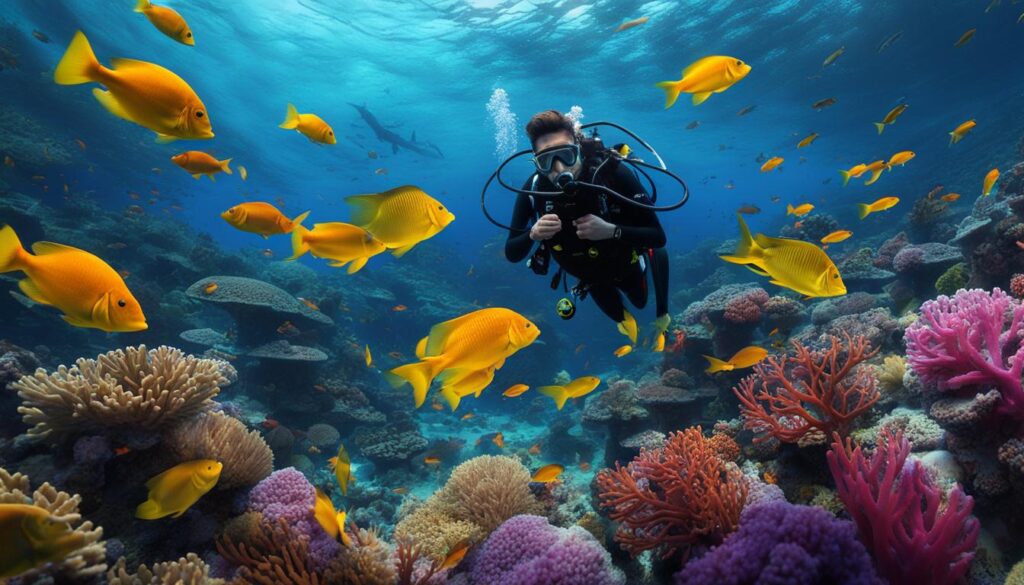We may earn money or products from the companies mentioned in this post.
As humans, we often forget the vast and interconnected world that exists beneath the surface of our bodies of water. Aquatic ecosystems are complex and fragile, and understanding them is crucial for our planet’s health and sustainability. In this comprehensive guide, we will explore the intricacies of aquatic ecosystems, from understanding their ecology to examining their environmental impact. Whether you’re a seasoned marine biologist or a casual observer, there’s always more to learn about these fascinating systems.
By gaining an understanding of aquatic ecosystems, we can work towards preserving and restoring these invaluable environments. We’ll explore the benefits of having this knowledge, the techniques used to analyze them, and the various ways individuals can enhance their comprehension. Our guide aims to provide a comprehensive overview of the importance of understanding aquatic ecosystems and the role they play in our planet’s health.
Key Takeaways:
- Understanding aquatic ecosystems is crucial for the health and sustainability of our planet.
- There are numerous benefits to gaining knowledge about these systems, including informed decision-making and sustainable resource management.
- Analysis of aquatic ecosystems involves methods such as studying food webs and nutrient cycles to understand their ecology.
- Education plays a vital role in mastering aquatic ecosystems, and there are various courses and field trips available.
- Aquatic ecosystems have a significant impact on the environment, influencing water quality, climate regulation, and overall planet health.
Benefits of Understanding Aquatic Ecosystems
Having knowledge about aquatic ecosystems is crucial for multiple reasons. By comprehending the intricacies of these ecosystems, we can make informed decisions to preserve and protect them, ultimately ensuring a sustainable future for our planet.
Importance of Aquatic Ecosystem Knowledge
Understanding aquatic ecosystems provides us with valuable insights into the environmental impact of human activity. It helps us to appreciate the interconnectedness of these ecosystems and the importance of preserving their delicate balance. By having knowledge of these ecosystems, we can work together to conserve and restore them.
Enhancing Knowledge of Aquatic Ecosystems
By enhancing our knowledge of aquatic ecosystems, we can improve our ability to manage our natural resources. This includes understanding the impact of climate change on these ecosystems, the role of aquatic organisms in maintaining water quality, and the impact of human activities on these systems. Through education and exploration, we can enhance our understanding of aquatic ecosystems and work towards developing sustainable solutions for our environment.
“The health of our waters is the principal measure of how we live on the land.” – Luna Leopold
In conclusion, having a thorough understanding of aquatic ecosystems is essential for preserving our planet’s health and ensuring a sustainable future. By comprehending the benefits of understanding these ecosystems and enhancing our knowledge of their intricate dynamics, we can actively work towards protecting these invaluable environments.
Aqua Ecology Comprehension: Analyzing Aquatic Environments
Understanding aquatic ecosystems requires a comprehensive analysis of their ecological dynamics. By examining the interrelationships of the various components of these systems, we can gain a deeper understanding of their intricacies and the impact they have on the environment. Ecosystem analysis for aquatic environments involves various methods and concepts, including:
- Studying Food Webs: Food webs are the intricate relationships between organisms in an ecosystem that rely on each other for survival. Understanding the complexities of food webs in aquatic ecosystems involves analyzing the feeding habits of various organisms and the transfer of energy between them.
- Examining Nutrient Cycles: Nutrient cycles involve the movement of essential elements, such as carbon, nitrogen, and phosphorus, through an ecosystem. Analyzing these cycles in aquatic environments helps us understand how different organisms contribute to the overall health of the system.
- Measuring Water Quality: The quality of water in aquatic ecosystems plays a crucial role in the health of the system. Measuring water quality involves analyzing various factors, such as pH levels, dissolved oxygen, and nutrient concentrations.
- Monitoring Biodiversity: Biodiversity in aquatic ecosystems refers to the variety of species and ecosystems present in the system. Monitoring biodiversity involves analyzing the different species present in the ecosystem and their ecological roles.
By comprehensively analyzing these and other factors, we can enhance our understanding of aquatic ecosystems and their ecological dynamics. This understanding is crucial not only for scientific research but also for conservation efforts and sustainable resource management.
Mastering Aquatic Ecosystems: Education and Exploration
Enhancing our understanding of aquatic ecosystems is crucial for their conservation and sustainable management. Thankfully, there are numerous educational opportunities available for individuals to deepen their knowledge of these complex ecosystems.
Aqua Ecosystem Education
One of the best ways to learn about aquatic ecosystems is through formal education programs. Many universities and colleges offer specialized courses in aquatic ecology, providing students with the chance to learn about the various components that make up an aquatic ecosystem and the interrelationships between them. Students may study topics such as aquatic biogeochemistry, limnology, and marine biology, among other things.
Tip: Look for schools with extensive research programs in aquatic ecology. These programs often provide students with hands-on experience working with aquatic ecosystems, further cementing their understanding of the subject matter.
Exploring Aquatic Ecosystems
Another way to enhance your understanding of aquatic ecosystems is through field trips and exploratory expeditions. These experiences provide a unique opportunity to witness firsthand the intricacies of these ecosystems and the biodiversity that they support. Some organizations offer guided tours that allow visitors to explore specific aquatic ecosystems such as coral reefs, wetlands, and estuaries.
Tip: Before embarking on an exploratory expedition, it is important to research the specific ecosystem you will be visiting and familiarize yourself with any rules and regulations governing access to the area. Always practice responsible ecotourism to minimize your impact on the ecosystem.
Mastering Aquatic Ecosystems
Those who are particularly interested in aquatic ecosystems may consider pursuing a career in the field. Careers in aquatic ecology can range from research and conservation work to resource management and environmental consultancy. To achieve mastery in the field, individuals may pursue advanced degrees in aquatic ecology, participate in ongoing research projects, and stay up-to-date on the latest scientific findings through publications and conferences.
Tip: Start by exploring internships and entry-level positions in the field to gain practical experience and determine if a career in aquatic ecology is right for you.
By taking advantage of these educational opportunities, individuals can gain a deeper understanding and appreciation for aquatic ecosystems. This knowledge is crucial for their conservation and sustainable management, ensuring that these valuable resources are preserved for future generations to enjoy.
The Environmental Impact of Aquatic Ecosystems
Aquatic ecosystems have a vital role in shaping our environment, and it is essential to understand their impact for conservation efforts. By exploring these ecosystems, we can better appreciate their influence on water quality, climate regulation, and the overall health of our planet.
The Importance of Aquatic Ecosystem Knowledge
Understanding the environmental impact of aquatic ecosystems is crucial for conservation efforts. A lack of knowledge can potentially lead to the destruction of these fragile systems, resulting in devastating consequences for the environment and human populations. Therefore, it is essential to increase awareness and promote education on the significance of these ecosystems.
Exploring Aquatic Ecosystems
Exploring aquatic ecosystems is an excellent way to gain insight into their environmental impact. By diving into these ecosystems, we can observe the underwater biodiversity and witness firsthand how the ecosystem functions. We can also study the water quality, nutrient levels, and measure the impact of human activity on these environments.
The Need for Conservation and Restoration
The environmental impact of aquatic ecosystems not only affects these systems, but it also affects the health and livelihoods of human populations. By understanding the impact, we can work towards preserving and restoring these ecosystems. Conservation efforts such as restoring wetlands, reducing pollution, and responsible fishing practices are crucial in maintaining the health of these ecosystems and the environment as a whole.
In conclusion, understanding the environmental impact of aquatic ecosystems is vital for conservation efforts and for promoting a sustainable future for our environment. By exploring these ecosystems, increasing knowledge, and promoting conservation efforts, we can work towards preserving and restoring these valuable systems.
Conclusion
In conclusion, understanding aquatic ecosystems is vital for the preservation and sustainability of our planet. By gaining knowledge about these complex systems, we can make informed decisions for conservation efforts and resource management. Aqua ecosystem education is a crucial step towards achieving this goal, and we must continue to explore and analyze these environments to fully appreciate their impact.
The importance of aquatic ecosystem knowledge cannot be overstated, as these ecosystems have a significant impact on the environment as a whole. By recognizing their role in water quality and climate regulation, we can work towards preserving and restoring these invaluable systems.
Through this comprehensive guide, we hope to have provided you with a deeper understanding and appreciation for aquatic ecosystems. By continuing to expand our understanding and education, we can pave the way for a sustainable future for our aquatic environments.
FAQ
What are aquatic ecosystems?
Aquatic ecosystems are ecosystems that are predominantly water-based, including both freshwater and marine environments. These ecosystems are home to a wide range of plants, animals, and microorganisms, and they play a crucial role in maintaining the health of our planet.
Why is it important to understand aquatic ecosystems?
Understanding aquatic ecosystems is important for several reasons. It allows us to appreciate the biodiversity and beauty of these environments, helps us make informed decisions for conservation efforts, and enables us to better manage resources sustainably.
How do aquatic ecosystems impact the environment?
Aquatic ecosystems have a significant impact on the environment. They help regulate climate by absorbing carbon dioxide and releasing oxygen, play a crucial role in water purification and filtration, and provide habitats for numerous species. Additionally, they contribute to nutrient cycling and overall ecosystem health.
How can I learn more about aquatic ecosystems?
There are several ways to learn more about aquatic ecosystems. You can enroll in educational courses or programs that focus on aqua ecology, participate in field trips or research expeditions, read books and scientific literature on the subject, and engage with organizations and experts in the field.
How can I contribute to the conservation of aquatic ecosystems?
There are several ways to contribute to the conservation of aquatic ecosystems. You can reduce water pollution by practicing responsible waste disposal, conserve water by using it efficiently, support organizations and initiatives that work towards protecting these environments, and educate others about the importance of preserving aquatic ecosystems.
Are aquatic ecosystems at risk?
Yes, aquatic ecosystems are facing various threats, including pollution, habitat destruction, overfishing, and climate change. These factors can disrupt the delicate balance of these ecosystems and pose significant risks to the plants, animals, and communities that rely on them.
Can I visit aquatic ecosystems for recreational purposes?
Yes, many aquatic ecosystems offer recreational opportunities such as swimming, snorkeling, diving, fishing, and boating. However, it is important to do so responsibly and follow local regulations to minimize our impact on these fragile environments.
How can I get involved in aquatic ecosystem conservation?
You can get involved in aquatic ecosystem conservation by volunteering with organizations focused on water conservation, participating in clean-up events, supporting legislation and policies that protect these ecosystems, and spreading awareness about their importance through social media and community engagement.
Affiliate Disclosure: This post may contain affiliate links. If you purchase through our link, we may receive a small commission, but at no additional cost to you. For more information, please see our Disclosure statement.



